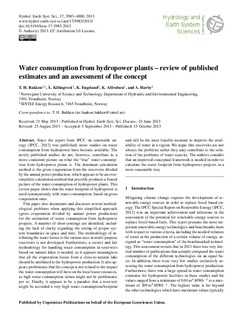Water consumption from hydropower plants – review of published estimates and an assessment of the concept
Journal article, Peer reviewed
Permanent lenke
http://hdl.handle.net/11250/2357855Utgivelsesdato
2013Metadata
Vis full innførselSamlinger
Sammendrag
Since the report from IPCC on renewable energy
(IPCC, 2012) was published; more studies on water
consumption from hydropower have become available. The
newly published studies do not, however, contribute to a
more consistent picture on what the “true” water consumption
from hydropower plants is. The dominant calculation
method is the gross evaporation from the reservoirs divided
by the annual power production, which appears to be an oversimplistic
calculation method that possibly produces a biased
picture of the water consumption of hydropower plants. This
review paper shows that the water footprint of hydropower is
used synonymously with water consumption, based on gross
evaporation rates.
This paper also documents and discusses several methodological
problems when applying this simplified approach
(gross evaporation divided by annual power production)
for the estimation of water consumption from hydropower
projects. A number of short-comings are identified, including
the lack of clarity regarding the setting of proper system
boundaries in space and time. The methodology of attributing
the water losses to the various uses in multi-purpose
reservoirs is not developed. Furthermore, a correct and fair
methodology for handling water consumption in reservoirs
based on natural lakes is needed, as it appears meaningless
that all the evaporation losses from a close-to-natural lake
should be attributed to the hydropower production. It also appears
problematic that the concept is not related to the impact
the water consumption will have on the local water resources,
as high water consumption values might not be problematic
per se. Finally, it appears to be a paradox that a reservoir
might be accorded a very high water consumption/footprint and still be the most feasible measure to improve the availability
of water in a region. We argue that reservoirs are not
always the problem; rather they may contribute to the solution
of the problems of water scarcity. The authors consider
that an improved conceptual framework is needed in order to
calculate the water footprint from hydropower projects in a
more reasonable way.
